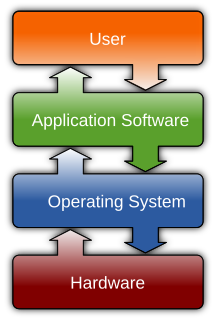The Simple Mail Transfer Protocol (SMTP) is a communication protocol for electronic mail transmission. As an Internet standard, SMTP was first defined in 1982 by RFC 821, and updated in 2008 by RFC 5321 to Extended SMTP additions, which is the protocol variety in widespread use today. Mail servers and other message transfer agents use SMTP to send and receive mail messages. Proprietary systems such as Microsoft Exchange and IBM Notes and webmail systems such as Outlook.com, Gmail and Yahoo! Mail may use non-standard protocols internally, but all use SMTP when sending to or receiving email from outside their own systems. SMTP servers commonly use the Transmission Control Protocol on port number 25.

An email client, email reader or more formally mail user agent (MUA) is a computer program used to access and manage a user's email.

The Maildir e-mail format is a common way of storing e-mail messages, where each message is kept in a separate file with a unique name, and each folder is a directory. The local filesystem handles file locking as messages are added, moved and deleted. A major design goal of Maildir is to eliminate program code having to handle locking, which is often difficult.
qmail is a mail transfer agent (MTA) that runs on Unix. It was written, starting December 1995, by Daniel J. Bernstein as a more secure replacement for the popular Sendmail program. Originally license-free software, qmail's source code was later dedicated in the public domain by the author.
A bounce message or just "bounce" is an automated message from a mail system, informing the sender of a previous message that that message had not been delivered. The original message is said to have "bounced". More formal terms for bounce message include "Non-Delivery Report" or "Non-Delivery Receipt" (NDR), [Failed] "Delivery Status Notification" (DSN) message, or a "Non-Delivery Notification" (NDN).
Email filtering is the processing of email to organize it according to specified criteria. The term can apply to the intervention of human intelligence, but most often refers to the automatic processing of incoming messages with anti-spam techniques - to outgoing emails as well as those being received.
getmail is a simple mail retrieval agent intended as a replacement for fetchmail, implemented in Python. It can retrieve mail from POP3, IMAP4, and Standard Dial-up POP3 Service servers, with or without SSL. It supports simple and domain (multidrop) mailboxes, mail filtering via any arbitrary program, and supports a wide variety of mail destination types, including mboxrd, maildir, and external arbitrary mail delivery agents. Unlike fetchmail, getmail's Python foundation makes it nearly immune to buffer overflow security holes. It also has a simpler configuration syntax than fetchmail, but supports fewer authentication protocols. The software can also function as a basic mail delivery agent.
Sieve is a programming language that can be used for email filtering. It owes its creation to the CMU Cyrus Project, creators of Cyrus IMAP server.
Email forwarding generically refers to the operation of re-sending an email message delivered to one email address to a possibly different email address(es).
The Courier mail server is a mail transfer agent (MTA) server that provides ESMTP, IMAP, POP3, SMAP, webmail, and mailing list services with individual components. It is best known for its IMAP server component.
An email box is the destination to which electronic mail messages are delivered. It is the equivalent of a letter box in the postal system.

An email agent is a program that is part of the email infrastructure, from composition by sender, to transfer across the network, to viewing by recipient. The best-known are mail user agents and mail transfer agents, but finer divisions exist.
fdm is a mail delivery agent and email filtering software for Unix-like operating systems, similar to fetchmail and procmail. It has been started in 2006 by a developer who later also started tmux in 2007.






